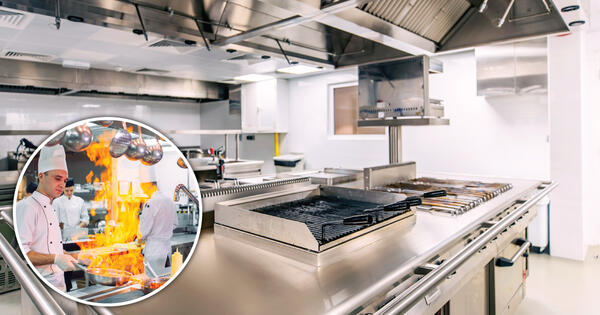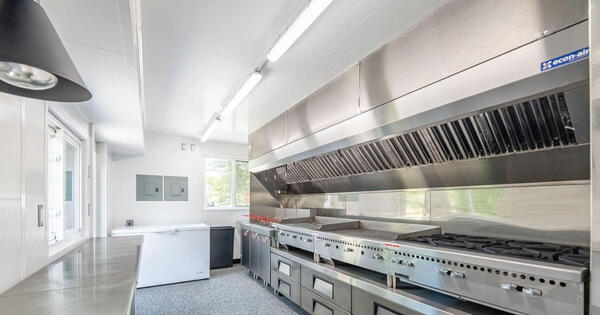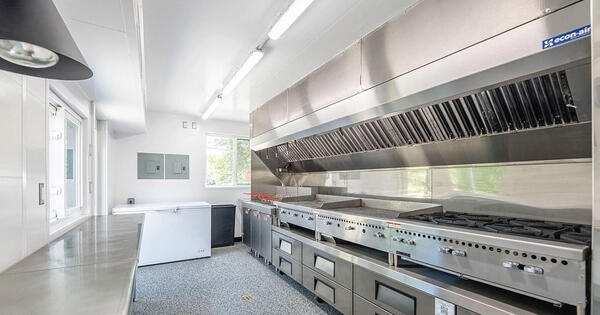Choosing the right panels for your food truck walls is crucial. The right panels can significantly impact hygiene, durability, aesthetics, and overall functionality of your mobile kitchen. In this blog, we'll explore the best options available and guide you through the key considerations to help you make an informed decision.
Key Considerations for Food Truck Wall Panels
When choosing wall panels for food trucks, it's important to keep in mind several key factors to ensure the walls are functional, safe, and compliant with health regulations. These factors include durability, ease of cleaning, resistance to moisture and heat, weight, and compliance with health regulations. Let's dive into each of these considerations in detail.
Durability
Durability is crucial because food trucks are mobile and often subjected to vibrations, bumps, and other stresses during transit. You need wall panels that can withstand these conditions without sustaining damage.
- High Impact Resistance: Choose panels that resist dents, scratches, and impacts to maintain their appearance and functionality over time.
- Long-lasting Materials: Materials like PVC and stainless steel are known for their longevity and ability to withstand harsh conditions.
Ease of Cleaning
Food preparation areas must be kept clean to ensure food safety. Therefore, the wall panels should be easy to clean and maintain.
- Smooth Surfaces: Opt for panels with smooth, non-porous surfaces that prevent dirt and grime from accumulating and make cleaning quick and easy.
- Stain Resistance: Panels that resist staining from food splatters and spills are preferable to maintain a hygienic environment.
Resistance to Moisture and Heat
Food truck interiors can become hot and humid, especially during cooking. The wall panels must resist moisture and heat to prevent warping, mold growth, and other issues.
- Moisture Resistance: Materials like PVC are waterproof and prevent moisture penetration, reducing the risk of mold and mildew.
- Heat Resistance: Ensure the panels can withstand high temperatures without melting or emitting harmful fumes. Stainless steel and ceramic tiles are excellent choices for areas near cooking equipment.
Weight
Weight is a critical consideration because food trucks have weight limits that can affect fuel efficiency and handling.
- Lightweight Options: Choose materials that provide the necessary durability and functionality without adding excessive weight. PVC panels are lightweight yet durable, making them a popular choice.
Compliance with Health Regulations
Health and safety regulations dictate the materials used in food preparation areas. It’s essential to select wall panels that comply with these regulations to ensure your food truck operates legally and safely.
- FDA Approval: In the U.S., look for panels that are Food and Drug Administration (FDA) approved for use in food preparation areas. In Canada, panels will need Canadian Food Inspection Agency (CFIA) approval.
- NSF Certification: NSF-certified panels meet strict public health standards and are ideal for food trucks.
By considering these factors — durability, ease of cleaning, resistance to moisture and heat, weight, and compliance with health regulations — you’ll be able to choose the best wall panels for your food truck. This will ensure a safe, efficient, and hygienic environment for food preparation and service.
Types of Panels Suitable for Food Trucks
When it comes to outfitting a food truck, choosing the right wall panels is essential for creating a functional and safe environment. Here, we’ll explore the pros and cons of several types of panels suitable for food trucks: stainless steel, FRP, PVC wall panels like Trusscore Wall&CeilingBoard, and aluminum composite panels.
Stainless Steel Panels
Stainless steel panels are metal sheets known for their durability, resistance to corrosion, and ability to withstand high heat, commonly used in commercial kitchens and food trucks.
| Pros of Stainless Steel Panels | Cons of Stainless Steel Panels | ||
|---|---|---|---|
| Durability: Stainless steel is incredibly durable, resistant to impacts, and can withstand the daily wear and tear of a food truck environment. | Higher Cost: Stainless steel panels can be more expensive compared to other materials, which might be a significant factor if you’re on a tight budget. | ||
| Ease of Cleaning: The smooth, non-porous surface makes stainless steel easy to clean and sanitize, which is crucial for maintaining hygiene standards. | Weight: Stainless steel is heavier than some other panel options, which can add to the overall weight of the food truck and potentially affect fuel efficiency and handling. | ||
| Resistance to Heat and Moisture: Stainless steel can handle high temperatures and is resistant to moisture, making it ideal for areas near cooking equipment. |

FRP
Fiberglass reinforced plastic (FRP) panels are composite wall panels made from a polyester resin reinforced with fiberglass, offering moisture resistance and durability at an affordable price.
| Pros of FRP | Cons of FRP | ||
|---|---|---|---|
| Affordability: FRP panels are generally more affordable than stainless steel, making them a cost-effective option for many food truck owners. | Staining: FRP panels can be prone to staining, especially if they aren’t cleaned promptly and thoroughly. | ||
| Resistance to Moisture: These panels are highly resistant to moisture, reducing the risk of mold and mildew in the humid environment of a food truck. | Need for Proper Sealing: To maintain their moisture resistance, FRP panels must be properly sealed, which can require additional time and effort during installation. | ||
| Durability: FRP panels are strong and resistant to impacts, making them suitable for the rigors of a food truck. | Weight of Backer Board: FRP panels often require a backer board for installation, which can add to the weight and complexity of the setup in a small space. |

PVC Wall Panels
PVC panels like Trusscore Wall&CeilingBoard are lightweight, plastic wall coverings that are easy to install, highly resistant to moisture and mold, and simple to clean, making them ideal for food truck interiors.
| Pros of Trusscore Wall&CeilingBoard | Cons of Trusscore Wall&CeilingBoard | ||
|---|---|---|---|
| Lightweight: Trusscore Wall&CeilingBoard weighs 40% less than drywall and doesn’t need to be installed with a backer like FRP, which is helpful for maintaining the overall weight of the food truck. | Heat Sensitivity: PVC panels shouldn’t be installed as a backsplash to stoves, ovens, or grills because they can warp or melt under high temperatures. You’ll need to use an alternative material in high-heat areas. | ||
| Easy to Install: Trusscore panels have a pre-punched screw flange and a tongue and groove interlocking system, allowing it to be installed four times faster than drywall and twice as fast as FRP, saving time and labor costs. | Need for Proper Sealing: To meet FDA, CFIA, and USDA requirements for areas where food is prepared, all Trusscore joints need to be sealed with caulk, which can add time to the install process. | ||
| Resistant to Moisture and Mold: Trusscore panels are 100% moisture and water resistant, so they won’t degrade or deteriorate in wet or damp environments, and they won't support the growth of mold or mildew. | |||
| Ease of Cleaning: Trusscore panels have a smooth, non-porous finish that makes it tough for bacteria or viruses to take hold. The stain-resistant panels are also easy to clean — they can be routinely cleaned with chemical cleaners and disinfectants with no issue. | |||
| Regulatory Compliance: Trusscore Wall&CeilingBoard is compliant with the CFIA, the FDA, and the U.S. Department of Agriculture (USDA) requirements for areas where food is prepared. |

Aluminum Composite Panels
Aluminum composite panels are made of two thin layers of aluminum bonded to a non-aluminum core, providing a lightweight, durable, and corrosion-resistant option for various applications, including food trucks.
| Pros of Aluminum Composite Panels | Cons of Aluminum Composite Panels | ||
|---|---|---|---|
| Durability: Aluminum composite panels are durable and resistant to impacts, making them suitable for the mobile environment of a food truck. | Aesthetic Appeal: Some may find the aesthetic appeal of aluminum composite panels less attractive compared to other materials like stainless steel. | ||
| Lightweight: These panels are lighter than stainless steel, which helps in managing the overall weight of the food truck. | Potential Higher Cost: Depending on the specific type and finish, aluminum composite panels can be more expensive than other options like PVC or FRP. | ||
| Ease of Installation: Aluminum composite panels are easy to install, reducing labor time and costs. | |||
| Resistance to Corrosion: Aluminum is resistant to corrosion, ensuring a long-lasting and low-maintenance solution. |

Trusscore Wall&CeilingBoard Food Truck Case Study
Call Your Mother Deli, a growing bagel deli, needed a temporary solution to serve customers while opening new brick-and-mortar stores. Partnering with tiny home builder Movable Roots, they designed a 190-square-foot mobile kitchen using Trusscore Wall&CeilingBoard throughout the interior.
The goal was to create a functional, easy-to-clean, aesthetically pleasing kitchen that complied with health regulations. Traditional materials like FRP were heavy and lacked visual appeal.
“FRP is really a go-to in what I've had experience with in some of the early market of the commercial kitchen space,” says Alex Cheatham, Production Director at Movable Roots. “But a big factor that we have to take into account in everything that we do is weight. With FRP, you have to put up a heavy backerboard for the FRP to go against. And to be honest, FRP is not very aesthetically pleasing.”
Trusscore Wall&CeilingBoard offered several advantages: It’s 100% water-resistant, easy to clean with a non-porous, stain-resistant surface, and compliant with health regulations from the CFIA, FDA, and USDA. The panels' tongue and groove interlocking system and availability in various lengths allowed for a seamless, professional finish.



Movable Roots found Trusscore easy to work with, meeting their high standards and eliminating almost all seams, contributing to a sleek look.
“Most of the time, the kitchen is never seen when you go to a restaurant. You never see the kitchen. But in a unit like this, the orders are happening at the kitchen window. And just eight feet behind [the window] is all of the walls that the customer can see. So, the wall finish we chose wasn't just for the employees. It's also for everyone who walks up to that truck, and they can see in. You can't hide. It has to be a good finish,” says Alex.
Alex also highlighted its aesthetic appeal and durability, noting that the panels stood up well during installation and with heavy equipment movement, and were easy to clean.
“From a builder standpoint, there's cleanability for the end user, but also for us working with it,” says Alex. “Sometimes stuff happens, and things might get a ding or a dent of scratch from us in the build process. [Trusscore] withstood the amount of time it took for us to put the unit together, moving in all the heavy equipment. It was very easy for us to clean as well before finishing up.”
Trusscore Wall&CeilingBoard proved to be an excellent choice for Call Your Mother Deli’s mobile kitchen, meeting the project's requirements for durability, cleanability, and aesthetic appeal. This case study illustrates how choosing the right materials can significantly impact the functionality and appearance of a food truck.



Selecting the right wall panels for your food truck is a critical decision that affects your operation's efficiency, hygiene, and aesthetics. By considering factors like durability, ease of cleaning, resistance to moisture and heat, weight, and compliance with health regulations, you can make an informed choice. Whether you opt for stainless steel, FRP, PVC, aluminum composite, or vinyl panels, weigh the pros and cons to find the best fit for your specific needs and budget.
See More Food Trucks & Mobile Kitchens Outfitted with Trusscore
ROXBOX Containers converts shipping containers into mobile kitchens and bars for food and drink brands. From kitchen areas to walk-in coolers, they chose Trusscore Wall&CeilingBoard to line the walls of these three projects:

Simply Pizza Mobile Kitchen
The Simply Pizza mobile container kitchen has easy to clean Trusscore Wall&CeilingBoard panels installed on its interior walls to keep the space looking its best for every event.

Mythology Whiskey Garden
When Mythology Distillery commissioned a full-service container bar and container kitchen from ROXBOX , Trusscore Wall&CeilingBoard was trusted for the interior walls and walk-in cooler.

Mad Eggs Mobile Kitchen
This container is outfitted with washable Trusscore Wall&CeilingBoard panels for Mad Eggs and Rise Up Coffee Roasters in Easton, Maryland to serve food outside company HQ.





